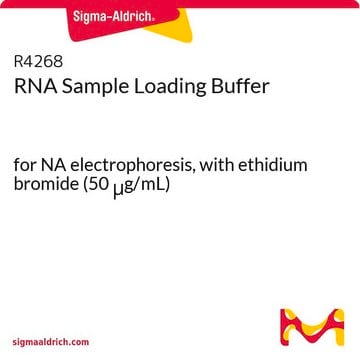S9305
SYBR® Green II RNA gel stain
10,000 × in DMSO
Synonym(s):
RNA gel dye, SYBR® RNA dye, safer gel stain
Sign Into View Organizational & Contract Pricing
All Photos(2)
About This Item
Recommended Products
usage
1 mL sufficient for 100 mini-gels
Quality Level
greener alternative product characteristics
Designing Safer Chemicals
Learn more about the Principles of Green Chemistry.
sustainability
Greener Alternative Product
concentration
10,000 × in DMSO
greener alternative category
storage temp.
−20°C
Looking for similar products? Visit Product Comparison Guide
Related Categories
General description
SYBR® Green II is a highly sensitive stain for post electrophoresis staining of RNA and ssDNA in agarose or polyacrylamide gels. SYBR® Green II is not selective for RNA staining but does exhibit a higher quantum yield when bound to RNA than to double stranded DNA.
Sigma Life Science is committed to bringing you Greener Alternative Products, which adhere to one or more of The 12 Principles of Greener Chemistry. This product has inherently safer chemistry, compared to the standard use of ethidium bromide for staining. For more information see publication found in related content.
Application
SYBR® Green II RNA gel stain has been used:
- for the quantification of ribonucleic acid (RNA) in Escherichia coli
- for staining 5′-ETS rRNA species separated on polyacrylamide gel prior to Northern blot analysis
- to stain formaldehyde agarose gels to visualize RNA bands
Features and Benefits
- Ultrasensitive stain for post-electrophoresis staining of RNA and ssDNA
- Excited maximally at 497 nm with a secondary excitation peak at 254nm
- The fluorescence emission of SYBR®Green II stained RNA is centered at 520 nm
- Staining agarose/formaldehyde gels with SYBR Green II does not interfere with the transfer of RNA to membranes or subsequent hybridization in Northern blot analysis as long as 0.1% -0.3% SDS is included in prehybridization and hybridization buffers to remove the dye
- Might facilitate the detection of viroid RNAs and multicopy cellular RNA species
- More sensitive than ethidium bromide in applications that require extremely sensitive detection techniques such as single-strand conformation polymorphism (SSCP) analysis
Legal Information
SYBR is a registered trademark of Life Technologies
replaced by
Product No.
Description
Pricing
WGK
WGK 3
Personal Protective Equipment
dust mask type N95 (US), Eyeshields, Gloves
Choose from one of the most recent versions:
Already Own This Product?
Find documentation for the products that you have recently purchased in the Document Library.
Customers Also Viewed
Michael Richmond et al.
Biochemistry, 50(12), 2298-2312 (2011-02-09)
In this work, we describe RapA-dependent polyadenylation of model RNA substrates and endogenous, RNA polymerase-associated nucleic acid fragments. We demonstrate that the Escherichia coli RNA polymerase obtained through the classic purification procedure carries endogenous RNA oligonucleotides, which, in the presence
Benjamin Lau et al.
Molecular cell, 81(2), 293-303 (2020-12-17)
Ribosome assembly is catalyzed by numerous trans-acting factors and coupled with irreversible pre-rRNA processing, driving the pathway toward mature ribosomal subunits. One decisive step early in this progression is removal of the 5' external transcribed spacer (5'-ETS), an RNA extension
Human ??defensin-1 and -2 expression in the gingiva of patients with specific periodontal diseases
S. Vardar-Sengul
Journal of Periodontal Research (2007)
Dyes for in vitro detection of nucleic acids and proteins.
BioProbes, 20, 12-13 (1994)
L G Lee et al.
Cytometry, 7(6), 508-517 (1986-11-01)
The purpose of this study was to find a 488-nm excitable fluorescent dye for reticulocyte analysis by the use of fluorescence activated cell cytometry. The chemical structure of thioflavin T, a dye used for reticulocyte analysis with 457-nm excitation, was
Our team of scientists has experience in all areas of research including Life Science, Material Science, Chemical Synthesis, Chromatography, Analytical and many others.
Contact Technical Service










